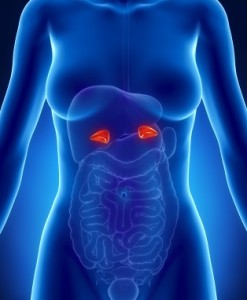Tired but Wired? 3 Foods to Eat + 3 to Avoid to Heal Your Adrenals
After taking care of patients for the past 25 years, I’m accustomed to the push back that occurs with adrenal problems. (In fact, I suspect you’ll have a few yourself in response to this article, and I look forward to hashing it out in the comments section). I get it – when you’re tired but wired, like I was in my mid-thirties, the last thing you want is for some doctor to say is that you need to ditch the coffee or vegan scones. As one patient put it, “Dr. Sara, you’ll have to pry that coffee mug out of my cold, dead fingers if you want me to give it up.” Um, OK.
But that’s what works when it comes to healing your misunderstood adrenals. I know because I’ve been there, with certifiable adrenal dysregulation based on symptoms and laboratory confirmation, and the feeling of being overwhelmed, weight loss resistant, depleted and too tired for sex, irritable, and most definitely addicted to caffeine. But when you persist in jacking up your adrenal function, it’s akin to taking out a high-interest loan that you’ll need to repay sometime soon (see symptoms below). It was only when I applied the basic tenet of functional medicine to my own life that I began to heal: remove the factors that cause imbalance, and provide the factors that create balance. That’s the topic for today – read on.
The Adrenal Backstory
Your adrenal glands are about the size of a pencil eraser, and sit on top of your kidneys like sentries, on guard and ready to release cortisol, the fight-flight-freeze hormone, when you’re stressed or under threat.
 When I first started helping women and men with their hormones back in about 1990, I didn’t know that the root cause of nearly every hormone problem was adrenal dysregulation. It’s important to understand this point, because creating natural hormone balance begins with the cortisol unlock, which means nourishing the adrenals, even when you feel too depleted to do so. The alternative is an adrenal crash, and no one wishes that on you.
When I first started helping women and men with their hormones back in about 1990, I didn’t know that the root cause of nearly every hormone problem was adrenal dysregulation. It’s important to understand this point, because creating natural hormone balance begins with the cortisol unlock, which means nourishing the adrenals, even when you feel too depleted to do so. The alternative is an adrenal crash, and no one wishes that on you.
Signs of Adrenal Disharmony
Which of these symptoms have experienced in the past 6 months?
- A feeling you’re constantly racing from one task to the next?
- Feeling wired yet tired?
- A struggle calming down before bedtime, or a second wind that keeps you up late?
- Difficulty falling asleep or disrupted sleep?
- A feeling of anxiety or nervousness—can’t stop worrying about things beyond your control?
- A quickness to feel anger or rage—frequent screaming or yelling?
- Memory lapses or feeling distracted, especially under duress?
- Sugar cravings (you need “a little something” after each meal, usually of the chocolate variety)?
- Increased abdominal circumference, greater than 35 inches (the dreaded abdominal fat, or muffin top—not bloating)?
- Skin conditions such as eczema or thin skin (sometimes physiologically and psychologically)?
- Bone loss (perhaps your doctor uses scarier terms, such as osteopenia or osteoporosis)?
- High blood pressure or rapid heartbeat unrelated to those cute red shoes in the store window?
- High blood sugar (maybe your clinician has mentioned the words prediabetes or even diabetes or insulin resistance)?
More than 3-5 symptoms indicate that you are likely to have a problem with dysregulated adrenal function. I advise testing as the next step, ideally with diurnal dried urine or saliva testing. Note that these are symptoms of high cortisol; the symptoms of low cortisol, which may occur within the same day, can be found in my first book, The Hormone Cure.
Keep in mind that your control system for adrenal function, which I call the “Hypothalamic-Pituitary-Adrenal-Thyroid-Gonadal” axis, is complex yet wise. If you suspect or know that you have adrenal issues, collaborate with a functional medicine professional to work with the innate intelligence of your body, rather than against it with pills, unproven potions or hype. As you age, cells become more resistant to cortisol, which jacks up your serum levels and may be associated with lower cortisol inside your cells. These two imbalances—in the blood and in the cells— means that you may feel tired (low cortisol) yet wired (high cortisol).
3 Foods to Avoid
When it comes to healing your adrenals, the idea is to lower stress or reduce the perceptions of stress, or both.
- Caffeine. Mostly a problem for the 51 percent of the population like me who are genetically slow metabolizers, caffeine has a threshold effect. Caffeine raises cortisol and reduces insulin sensitivity in your cells.1MacKenzie, T., et al. “Metabolic and hormonal effects of caffeine: randomized, double-blind, placebo-controlled crossover trial.” … Continue reading I need to keep my intake of caffeine less than 200 mg day (ideally, none at all), in order to fall asleep at a decent hour. Sleep is crucial to healing your adrenals: there’s a beginning, middle, and end to the “adrenal repair” conversation every night, and if you miss some of that repair, it will show up later as symptoms or lack of resilience.
- Sugar and artificial sweeteners. Eating sugar cranks up (then down) your blood sugar, and the effect may be more exaggerated if you have adrenal dysregulation. The effect between sugar and cortisol is bidirectional: stress increases your level of cortisol, which makes blood sugar rise – a nifty trick of evolution that allows you to fight off or flee a predator. Because of the relationship between cortisol and blood sugar, you can get into a vicious cycle of worsening blood glucose and adrenal dysregulation if you don’t manage your blood sugar well by eating foods that stabilize it, like clean protein, fat, and fiber.
- Food intolerances: particularly gluten, dairy, soy. Food intolerances trigger the stress response in your body. The irony is that many food intolerances are toward foods that have addictive properties, so it can take an iron will to remove them from your food plan. This is not a situation where moderation is your friend. If you’re unsure about food intolerances, try an elimination/provocation diet or perform serum testing with a functional medicine professional.
The preceding list is abbreviated; keep in mind there are other considerations. For instance, a very low carbohydrate diet can raise your cortisol and tax your adrenals. Toxic people who suck you dry are a major cause of adrenal dysregulation, particularly in women. And alcohol? Mold? Being stuck in a job or marriage you don’t love? Sigh. Let’s save those for an entire article.
3 Foods to Eat
- Get clean, nutrient-dense protein at the right dose for you. That means not too much and not too little. For most women, that’s 20 to 30 grams of protein per meal, or 75 to 100 grams per day. People who are more active need more protein. When I was trying to lose weight before getting married, I went on a very low carb diet, and didn’t lose weight, but worsened my thyroid and adrenal function. The Atkins diet has been shown to raise cortisol
- Add maca to your shake. I love it when a stressed-out woman with anxiety symptoms and low sex drive feels better after adding 1-2 teaspoons of maca powder to her morning protein shake. From Peru, maca is an adrenal adaptogen (i.e., helps you adapt to your environment, both internal and external) that has been shown to help anxiety, depression, low sex drive, sleep, and to reset the control system, the HPATG.2Meissner, H., et al. “Use of a gelatinized maca (Lepidium peruvianum) in early-postmenopausal women—a pilot study.” International Journal of … Continue reading If you get too much maca, it can stimulate the breast tissue and cause tenderness. Another option is ashwagandha, which I get in powdered form from Banyan botanicals. It’s an Ayurvedic herb that helps you reset cortisol so it’s neither too high nor too low, and improves stress resilience.3Chandrasekhar, K., et al. “A prospective, randomized double-blind, placebo-controlled study of safety and efficacy of a high-concentration … Continue reading I take it to sleep at night.
- Eat healthy fats every day. You’ll find in my daily food plan a few staples: marine fat, usually from cold-water, low-mercury fish like salmon and halibut. Coconut oil, rich in medium-chain triglycerides that don’t require special processing by the gallbladder to be assimilated. And extra dark chocolate, which is chock full of monounsaturated fats necessary for a smart brain and has been shown to reset cortisol4Martin, F. P., et al. “Metabolic effects of dark chocolate consumption on energy, gut microbiota, and stress-related metabolism in free-living … Continue reading Yum!
Final Word
I struggled for many years with adrenal dysregulation, in part because I didn’t learn about it in medical school, but also because I thought my lack of energy was some sort of moral failing – and I’m a doctor! Don’t let that happen to you. Investigate the biological underpinnings of your symptoms, starting with adrenal issues, since they are the root of nearly every hormone imbalance that I’ve seen in practice.
That’s a quick starting place for healing your adrenals. If you want to learn more, click here to check out my new online course with MindBodyGreen.
References
| ↑1 | MacKenzie, T., et al. “Metabolic and hormonal effects of caffeine: randomized, double-blind, placebo-controlled crossover trial.” Metabolism 56, no. 12 (2007): 1694-1698; Lovallo, W. R., et al. “Cortisol responses to mental stress, exercise, and meals following caffeine intake in men and women.” Pharmacology Biochemistry and Behavior 83, no. 3 (2006): 441-447. |
|---|---|
| ↑2 | Meissner, H., et al. “Use of a gelatinized maca (Lepidium peruvianum) in early-postmenopausal women—a pilot study.” International Journal of Biomedical Science 1 no. 1 (2005): 33–45; Meissner, H., et al. “Hormone-balancing effect of pre-gelatinized organic maca (Lepidium peruvianum Chacon): (III) Clinical responses of early-postmenopausal women to maca in double-blind, randomized, crossover configuration, outpatient study.” International Journal of Biomedical Science 2 no. 4 (2006): 375–94; Brooks, N. A., et al. “Beneficial effects of Lepidium meyenii (maca) on psychological symptoms and measures of sexual dysfunction in postmenopausal women are not related to estrogen or androgen content.” Menopause 15 no. 6 (2008): 1157–62; Dording, C. M., et al. “A double-blind, randomized, pilot dose-finding study of maca root (L. meyenii) for the management of SSRI-induced sexual dysfunction.” CNS Neuroscience and Therapeutics 14 no. 3 (2008): 182–91. |
| ↑3 | Chandrasekhar, K., et al. “A prospective, randomized double-blind, placebo-controlled study of safety and efficacy of a high-concentration full-spectrum extract of ashwagandha root in reducing stress and anxiety in adults.” Indian Journal of Psychological Medicine 34, no. 3 (2012): 255; Singh, N., et al. “An overview on ashwagandha: a Rasayana (rejuvenator) of Ayurveda.” African Journal of Traditional, Complementary and Alternative Medicines 8, no. 5S (2011). |
| ↑4 | Martin, F. P., et al. “Metabolic effects of dark chocolate consumption on energy, gut microbiota, and stress-related metabolism in free-living subjects.” Journal of Proteome Research 8 no. 12 (2009): 5568–79. |

